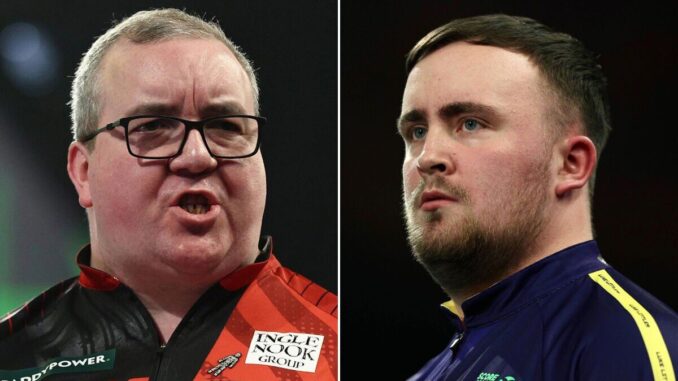
Stephen Bunting and Luke Littler have recently been at the center of attention in the world of professional darts. Their matches, known for high-quality gameplay and notable sportsmanship, have sparked widespread conversation among fans and players alike. These encounters have highlighted both the intense competition and the camaraderie that can exist within the sport.
At the Dutch Darts Masters, held in the Netherlands, Bunting and Littler faced off in a thrilling semi-final. This was a highly anticipated rematch following their previous encounter at the World Darts Championship, where Littler emerged victorious. However, this time, Bunting secured a narrow 7-6 victory, demonstrating his determination and strategic gameplay.
Both players showcased exceptional skill throughout the match. Littler impressed with a remarkable three-dart average of 107.59 and managed to hit seven 180s, a testament to his power and precision. Despite these achievements, his finishing proved inconsistent, with his highest checkout being 56. Bunting, in contrast, maintained a steady average of 99.55 and capitalized on key moments with a high checkout of 125, securing the win in critical stages of the match.
Beyond the technical aspects of their gameplay, the interactions between Bunting and Littler have sparked discussions about sportsmanship in darts. During their earlier World Darts Championship match, the players were seen exchanging fist bumps and offering congratulations on successful checkouts. While many admired this display of mutual respect, some observers found it unusual. One notable figure commented on the behavior, suggesting that such displays of camaraderie could be distracting in a competitive setting.
In response to these criticisms, Bunting defended his actions, emphasizing the importance of respect and positivity in the sport. He expressed frustration over the focus on such gestures instead of the quality of his performances, saying it was disappointing that people would choose to criticize moments of mutual respect rather than acknowledging the high standard of play. He also highlighted his personal connection with Littler, explaining that they both come from the same area and have known each other since Littler was a child. Bunting praised Littler’s talent and potential, expressing his hope that the young player continues to grow and succeed in the sport.
Despite his victory over Littler in the semi-final, Bunting fell short in the final of the Dutch Darts Masters against Rob Cross. In a closely contested match, Cross triumphed 8-5, claiming his fifth World Series title. Bunting reflected on his performance with optimism, stating that each game serves as a learning experience. He acknowledged the importance of analyzing both strengths and weaknesses to improve and return stronger.
Littler, despite his semi-final loss, continues to garner significant attention for his remarkable talent and rapid rise in professional darts. His performance in the tournament, including a notable victory over a top-ranked player, has solidified his status as one of the sport’s most promising young players. His precision and poise on the oche have earned him admiration from fans and fellow competitors, and his potential seems limitless.
The interactions between Bunting and Littler have also reignited a broader conversation about the role of sportsmanship in darts. While the sport is known for its competitive edge, gestures of respect and camaraderie are not uncommon. These moments highlight the balance between maintaining a fierce competitive spirit and showing respect for one’s opponent, which is a fundamental aspect of professional sports.
As darts continues to grow in popularity, the actions and attitudes of its players will undoubtedly shape the culture of the sport. The recent discussions surrounding Bunting and Littler’s behavior emphasize the evolving dynamics of professional darts and the importance of fostering a positive environment. While opinions on such displays may differ, they ultimately contribute to the rich and varied tapestry of the sport.
For both Bunting and Littler, their journeys in professional darts are far from over. Each match they play not only adds to their personal development but also contributes to the sport’s legacy. Their performances serve as an inspiration to aspiring players and remind fans of the skill, dedication, and respect that define darts at its highest level.
Ultimately, the matches between Bunting and Littler highlight the multifaceted nature of professional darts. Beyond the scores and statistics lies a deeper narrative of competition, growth, and mutual respect. These stories resonate not only with those who follow the sport closely but also with anyone who appreciates the values of sportsmanship and perseverance. As the sport continues to evolve, these moments will serve as lasting examples of what makes darts such a compelling and enduring competition.
Leave a Reply